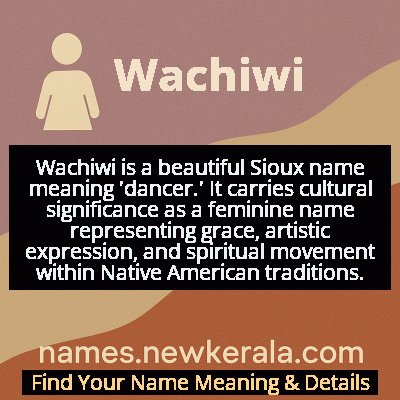Wachiwi Name Meaning & Details
Origin, Popularity, Numerology Analysis & Name Meaning of Wachiwi
Discover the origin, meaning, and cultural significance of the name WACHIWI. Delve into its historical roots and explore the lasting impact it has had on communities and traditions.
Name
Wachiwi
Gender
Female
Origin
Native
Lucky Number
4
Meaning of the Name - Wachiwi
Wachiwi is a beautiful Sioux name meaning 'dancer.' It carries cultural significance as a feminine name representing grace, artistic expression, and spiritual movement within Native American traditions.
Wachiwi - Complete Numerology Analysis
Your Numerology Number
Based on Pythagorean Numerology System
Ruling Planet
Uranus (Rahu)
Positive Nature
Strong sense of order, loyal, practical, and disciplined.
Negative Traits
Stubborn, overly serious, rigid, and prone to feeling restricted.
Lucky Colours
Blue, gray.
Lucky Days
Saturday.
Lucky Stones
Blue sapphire.
Harmony Numbers
1, 7, 8.
Best Suited Professions
Managers, engineers, accountants, organizers.
What People Like About You
Dependability, discipline, practicality.
Famous People Named Wachiwi
Wachiwi
Lakota Dancer and Cultural Ambassador
Known for preserving traditional Lakota dance forms and teaching them to younger generations
Wachiwi LaPointe
Educator and Cultural Preservationist
Founded a Native American cultural center and documented traditional dance practices
Wachiwi Red Bear
Traditional Artist and Storyteller
Revitalized interest in Sioux artistic traditions through dance-inspired visual arts
Name Variations & International Equivalents
Click on blue names to explore their detailed meanings. Gray names with will be available soon.
Cultural & Historical Significance
The name represents more than just physical movement; it embodies the rhythmic heartbeat of Sioux tradition and the continuous flow of cultural knowledge. In many Indigenous worldviews, dance functions as prayer in motion, making Wachiwi a name that symbolizes spiritual communication, community cohesion, and cultural resilience. During periods of cultural suppression, names like Wachiwi became acts of resistance and affirmation of Indigenous identity. Today, the name continues to honor the enduring spirit of Sioux cultural practices while adapting to contemporary contexts, serving as a reminder of the beauty and power inherent in traditional Indigenous arts and spiritual practices.
Extended Personality Analysis
Women named Wachiwi are typically characterized by their expressive nature, graceful presence, and deep connection to cultural heritage. They often exhibit a natural sense of rhythm and timing that extends beyond physical movement to how they approach life's challenges and opportunities. These individuals tend to be highly intuitive, possessing an ability to read social situations and emotional currents much like a dancer responds to music. Their 'dancing spirit' manifests as adaptability, allowing them to navigate changing circumstances with poise and resilience while maintaining their core values and identity.
Wachiwi's are often community-focused individuals who understand the importance of tradition while embracing innovation. They typically demonstrate strong emotional intelligence, sensing the needs of others and responding with empathy and support. Their artistic sensibility frequently expresses itself in various creative pursuits, whether through traditional arts, storytelling, or modern creative forms. The combination of cultural grounding and expressive freedom makes them effective bridges between generations and cultures. They tend to be passionate about preserving traditions while finding new ways to make them relevant, embodying the living, evolving nature of cultural heritage through their actions and relationships.
Modern Usage & Popularity
In contemporary usage, Wachiwi has experienced a meaningful resurgence primarily within Native American communities as part of broader cultural revitalization movements. The name is chosen by parents seeking to honor their Sioux heritage and instill cultural pride in their daughters, serving as a conscious connection to ancestral traditions. While it remains relatively uncommon in national naming statistics, its usage reflects important trends in Indigenous communities toward reclaiming traditional names and cultural practices. Outside Native communities, Wachiwi has gained some recognition among parents interested in unique, meaningful names with beautiful phonetic qualities and positive connotations related to artistry and movement. The name's modern usage demonstrates how traditional Indigenous names can maintain cultural specificity while also appealing to broader aesthetic and symbolic preferences, though it's most authentically used within contexts that understand and respect its cultural origins and significance.
Symbolic & Spiritual Meanings
Symbolically, Wachiwi represents the universal human capacity for expression, transformation, and connection through movement. Beyond its literal translation as 'dancer,' the name embodies the metaphorical dance of life itself—the rhythmic interplay between tradition and innovation, individual and community, earth and spirit. It symbolizes the ability to move gracefully through life's transitions while maintaining cultural and personal integrity. The dancer archetype associated with Wachiwi represents spiritual communication, as many Indigenous traditions view dance as embodied prayer and a means of connecting with divine forces. The name also carries symbolism related to balance and harmony, reflecting the dancer's need for physical equilibrium and the broader human quest for life balance. In contemporary interpretations, Wachiwi can symbolize cultural resilience—the ability to preserve identity while adapting to changing circumstances, much like traditional dances evolve while maintaining core elements. The name ultimately represents the joyful, purposeful movement through existence that honors both individual expression and collective tradition.

